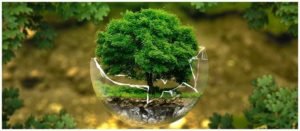ECOSYSTEM
An ecosystem is any place where a group of organisms live as a community in conjunction with the non-living components of the environment as a system. It is no different from our human community where every citizen of a city relies on its own resources and interacts with its environment. These organisms are linked to one another through an energy and nutrient cycle. Ecosystems are controlled by both external and internal factors. The ecosystem plays a vital role in keeping the living organisms safe and sound. We humans tend to exploit all the available natural resources and damage the ecosystem directly or indirectly on a major part. The damages results in bio-diversity loss of the environment
Why ecosystem is important to us?

Our daily living is based on ecosystem. We literally depend on ecosystem from the air we inhale to the food we eat. Everything comes from the nature. We depend on nature for our survival, without healthy ecosystems our drinking water isn’t clean nor is the air we breathe. In an ecosystem each and every living being has its purpose. Human beings are kind of at the top. Human beings rely on ecosystems for various purposes than any living being on this planet. People who spend a lot of time in nature tend to be happier than the rest who don’t. Eco system is the foundation of sustainable development. Whether you live in rural areas or in urban areas your dependency in ecosystem is the same. That is why is necessary to protect it. Ecosystem supports different food chains and food web. Our earth is considered as an ecosystem. The one which we tend to exploit continuously without giving it time to replenish it natural resources.
Human activities that impact the ecosystem.
There are certain human activities that impact the environment in the negative aspect. Below are listed a few impacts imposed by humans on the environment.
- Climate change- Climate change is one of the greatest threats to sustainability. The earth’s climatic conditions do fluctuate due to various reasons. However, several scientific studies prove that the global temperatures are rising due to human activities involving emission of greenhouse gases. There are several greenhouse gases, one which is carbon dioxide which is released from combustion of fossil fuels. As much as the future nears us so as the extinction of human race. With the development of industrialisation and deforestation of large tracts of lands globally has caused concentration of these gases increase in our atmosphere. Not only carbon dioxide but there are other such chemicals like methane (emitted during production of coal, natural gas), Nitrous oxide (emitted during agricultural and industrial activities) and other fluorinated gases.

- Pollution- Any activity that contaminates the environment by any means is called pollution. A contaminated environment evidently means a contaminated ecosystem. Pollutants include domestic, industrial and agricultural waste. Pollution can impact air, water and land. Pollution can be direct and indirect. Direct pollutions are easily identifiable, such as emissions from an industry or factory or power plant. Indirect pollutions are hard to identify individually as there may be many small pollutants which are harmless individually but together possess a great damage, such as household waste and other commonly used chemicals together contaminate the watersheds. Air pollution is not only caused by factory emissions but also is caused by vehicles in a vast majority. There are various other pollutions which together as a whole contaminate the earth.
- Habitat destruction- Habitat destruction occurs when any activity brought on by humans threatens the resident species and ecosystems. The common types of habitat destruction are deforestation, coral mining and desertification. These activities destroy the natural habitat of living organisms, resulting in their extinction.
- Overexploitation- Overexploitation is process of consumption of natural resources at a rate greater than the natural resources can replenish. Overhunting, land degradations, deforestation, over gazing are human induced activities which results in over exploitation. Overexploitation results in the destruction of one species, which may lead unto the destruction of entire mankind.
- Invasive species- Capturing a living species from its original habitat and bringing it to a foreign habitat may result in the extinction of species of the new kind or the existing kind. This may even result in overpopulation of certain species resulting an imbalance in the natural food chain. Smuggling of animals may pave way for such ecological destruction.

- Chemical waste- Many factories and industries all over the world dump their not so friendly chemical waste into water fields and barren lands. These toxic chemicals damage the environment they are imposed upon. Thus, not allowing life to sustain in that region. Chemical waste dumped in these areas are not only from factories and industries, but they are are dumped in the form of sewage which contain same amount of harmful chemicals collected from household pipelines, public restrooms, and many other places. These chemicals separately may seem harmless, but together as a whole possess the same amount of danger from industrial waste.
PROTECTING OUR PLANET STARTS WITH YOU.

We as humans knowingly or unknowingly destroyed as major part of our ecosystem. So it is our job to help nature to replenish itself. We need to give time for earth to get replenished.
Here are a few steps that anyone could follow to save our planet:
- Save natural resources.
- Conserve non-renewable energy sources.
- Use paper bags instead of plastic bags.
- Reduce, Reuse and Recycle as much as possible.
- Conserve water; avoid dumping chemical wastes and sewage into fresh water bodies and oceans.
- Stop deforestation and start practicing reforestation.
- Walk more and drive less.
- Use public transports more often.
- Encourage wildlife preserves.
- Adopt renewable sources of energy.
- Educate yourself and others about saving our ecosystem.
These are the possible ways one can adapt to change the ecosystem as a whole new better place

